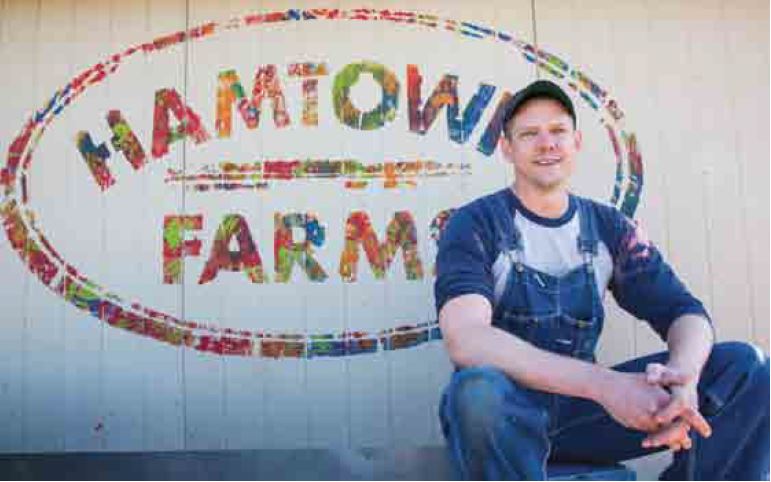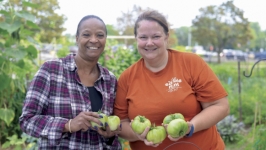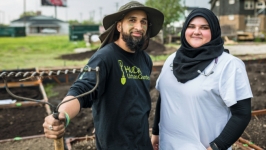How an Urban Farm Restored Faith in Hamtramck
Mike Davis was about to give up on his adopted city of Hamtramck. The neighborhood where he had purchased and lovingly restored a home for eight years had, in his words, “gotten kind of rough,” so he was looking at homes in the suburbs.
Around that time, Davis took to venting his frustrations on DetroitYES, an online community discussion board. Hamtramck’s mayor, Karen Majewski, connected with Mike on the forum asking what it would take to get him to stay. That cyber-connection led to a dinner at Davis’ home, where he and his friend and co-worker Julie Swartz pitched an idea to Majewski: Create a place where people in the community could go to develop a sense of investment in their neighborhood.
Davis had been driving past nine trash-strewn vacant lots on the corner of his street at Lumpkin and Wyandotte twice a day for eight years on his way to and from work. The city-owned parcels had been frozen for over 40 years as part of a lawsuit filed in the 1970s on behalf of families displaced by the construction of I-75. Davis and Swartz thought those lots would be the perfect location for their idea. Majewski enthusiastically agreed and helped secure a five-year permit for a community farm. And so, Hamtown Farms was born.
Groundbreaking on June 1, 2011, saw over 100 neighborhood volunteers showing up. “It was crazy,” recalls Davis. “Pretty much everything you see here was accomplished on that day.”
Hamtown Farms features raised beds for community gardening and orchards. Among other fruit trees, Hamtown Farms features the pawpaw, a little-known native Michigan tree with a large, sweet, custard-like fruit. The idea to grow the trees came from Swartz’s father, who had grown several of the trees in his yard in Sterling Heights. “Julie and I had breakfast, and she pulled a pawpaw fruit out of her purse and said ‘eat this,’” recalls Davis. “From that first bite it was like a bolt of lightning, and I said ‘That’s what we should do we should do: grow pawpaws!’ ”
For two years, Hamtown Farms expanded its reach into the neighborhood, working with a nearby school to host a raised bed and providing a place for neighbors to come and learn about farming and each other. “Hamtramck is Michigan’s most densely populated city, and it’s one of the poorest,” Davis notes. “And 48% of the housing is rental, so there is a lack of a sense of ownership. The farm gives people a sense of place, and kids need that.”
Trouble began for Hamtown Farms in July 2013 when the City of Hamtramck was placed under emergency financial management and, nearly simultaneously, a judge unfroze city-owned land assets. The city’s new emergency manager spoke with garden-permit holders about buying city-owned vacant land, but later backpedaled, requiring appraisals. Davis, who had already invested about $16,000 of his own money in the farm, knew the cost of an appraisal would likely be more than the value of the land. So he sat tight and waited to see what would happen next.
Later that month, Davis was driving to visit his family in St. Louis, Missouri, when he got a call from the emergency manager, letting him know that a business owner had secured an appraisal and made a purchase offer on the nine parcels. A frustrated Davis felt like giving up when he posted the news on Facebook to let everyone know that the farm was being sold. That’s when things really got interesting. Sharon Buttry, a local minister, contacted Davis to tell him not to give up.
“She said ‘Mike, this is much bigger than just you. You can’t just roll over,’ ” Davis recalls. Buttry saw the threat as much more than the potential loss of a community garden. “I really wanted to protect that space because it’s so beautiful, and it’s such a symbol of how diversity works well in our city,” she explains.
So Buttry rallied the community, and the next day City Hall was flooded with emails and phone calls. The emergency manager decided to sell the parcels at auction. Within a three-week period, Davis and friends raised over $35,000 through private donations and a crowd fundraiser, and in November, won the bid for eight of the nine parcels, saving Hamtown Farms.
“We were so relieved when the auction went well and we could continue our work,” says Swartz. “We were on such roll, and we weren’t ready to stop.”Hamtown Farms’ troubles aren’t over, however. They are still working to get a zoning variance to allow farming activities on the site. But Davis and Swartz remain secure in the knowledge that Hamtown Farms now has title to the land.
The experience has renewed Davis’ faith in Hamtramck. “I replaced the windows in my house, so clearly I am back feeling confident,” says Davis. “But more importantly, now I know all the kids names, and they know mine, so that’s probably the most powerful thing.”
Learn more at Hamtown Farms







